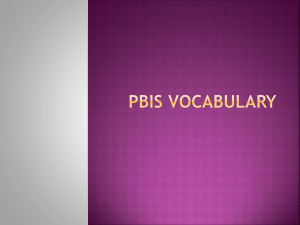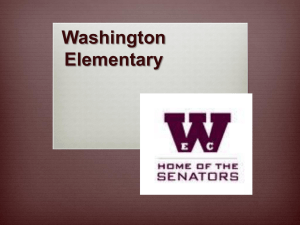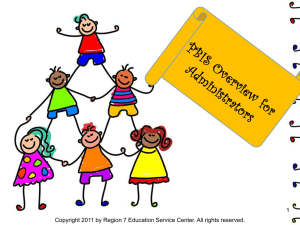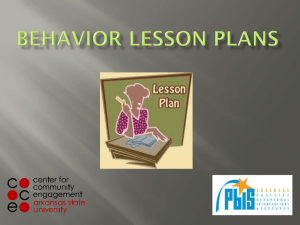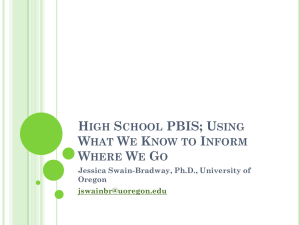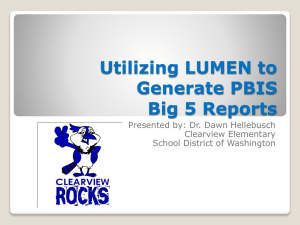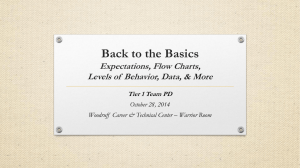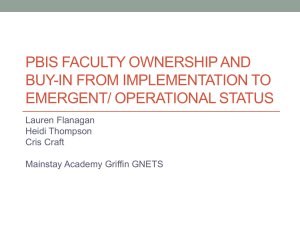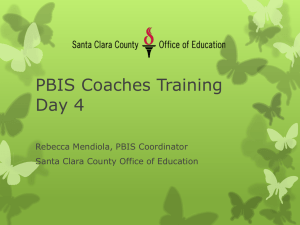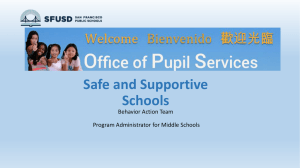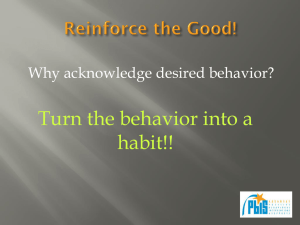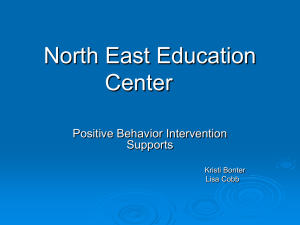Implementing PBIS in a Public School Program for Students With
advertisement
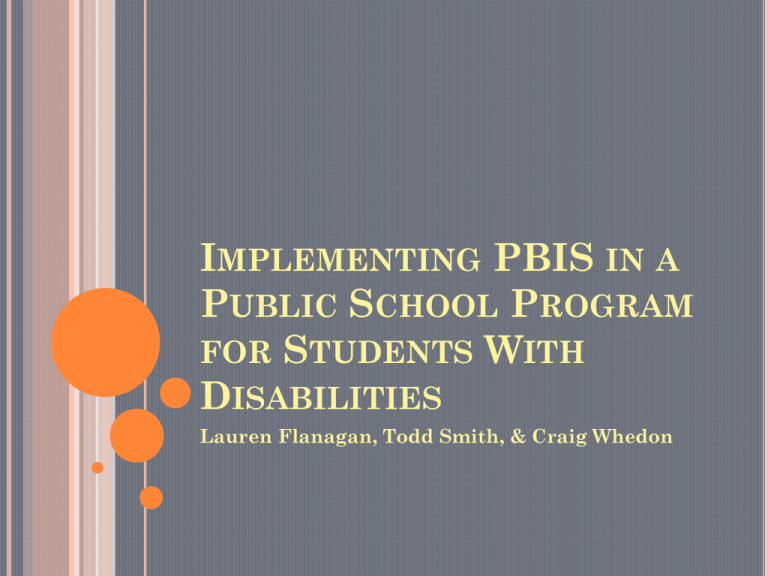
IMPLEMENTING PBIS IN A PUBLIC SCHOOL PROGRAM FOR STUDENTS WITH DISABILITIES Lauren Flanagan, Todd Smith, & Craig Whedon WE’RE HAVING AN ADOPTION! WE’VE GOT A BABY! Name: PBIS Place of Birth: Oregon, USA Training for Adoptive Parents: June 3-5, 2013 Date of Delivery to Adoptive Parents: August 5, 2013 OUR ADOPTION TEAM SOME IMPORTANT CHARACTERISTICS OF OUR ADOPTIVE FAMILY Strong relational connection among our team A common belief that positive behavior can be learned / taught Committed / Dedicated Enthusiastic Hard Working Comfortable with collaboration Supportive and positive FAMILY PREPARATION Mainstay Academy’s PBIS Core Values Safety, Respectfulness, and Responsibility Mainstay Academy PBIS Mission: It is our mission to work as a community to create a safe, positive and therapeutic school environment where students and staff members are taught and acknowledged for appropriate behavior. It is also our mission to facilitate positive behavior change, academic growth and emotional growth in our students and faculty. THE IMPLEMENTATION PLAN : BABY PBIS’ DEVELOPMENTAL MILESTONES 1. PBIS Team 2. Data Entry and Analysis 3. Clear School-Wide Expectations and Rules 4. Teaching Behaviors 5. Recognition & Rewards System 6. Effective Discipline Process 7. Faculty Commitment 8. Implementation / Action Plan 9. Classroom Behavior Supports 10. Evaluations and Assessments THE EXTENDED FAMILY PRESENTED OUR BIGGEST CHALLENGE Faculty and staff acceptance and commitment to PBIS Our enthusiasm had to be contagious Adoption had to be easy, fun and rewarding Baby PBIS had to look like part of the family AN ADOPTION CELEBRATION! ADOPTION CELEBRATION -SHOWER GAMES PBIS Walk – “Walk This Way!” PBIS Scramble Umbrella Activity THE PBIS “UMBRELLA” BEHAVIOR BEYOND PBIS Flow chart Definitions of Behaviors Student Achievement Model Mind Set Crisis Communication / four step counseling Regular, Structured Treatment Team Meetings Life Space Crisis Intervention Check in and Check out Functional Behavior Assessment Positive Behavior Intervention Planning BEHAVIOR FLOW CHART Does the behavior require out of classroom management? If the answer is No… Use classroom Management Tools Teach Replacement Skill (SAM) Manage Student Resistance (SAM) Communicate Consequence/Practice Replacement Skill Check for Understanding Complete Form (Minor – Classroom Managed) Document Behavior in LiveSchool and S.W.I.S. BEHAVIOR FLOW CHART Does the behavior require out of classroom management? If the answer is YES… Radio for assistance (Behavior Interventionist, Social Worker, Administrator,) Referring staff to complete Crisis Intervention Document (Major) and give to the above person Assess the Situation (Supervision, first aid, relief of staff, etc. DOES THE BEHAVIOR REQUIRE ADMINISTRATIVE DECISION? BEHAVIOR FLOW CHART DOES THE BEHAVIOR REQUIRE ADMINISTRATIVE DECISION? If the answer is NO… Continue to Manage Student Resistance (SAM, LSCI, Intensive Intervention) Complete intervention steps Identify behavior Communicate consequence and practice through intensive feedback to student Check for understanding Practice apologies Develop Behavior Contract – if needed Coach apology Return to class and complete documentation BEHAVIOR FLOW CHART DOES THE BEHAVIOR REQUIRE ADMINISTRATIVE DECISION? YES (O.S.S., Juvenile Complaint, Crisis Mental Health) Radio / Call for Administrator Continue to Manage Student Resistance (SAM, LSCI, Intensive Intervention) Complete intervention steps Identify behavior Communicate consequence and practice through intensive feedback to student Check for understanding Practice apologies Develop Behavior Contract – if needed Coach apology Return to class and complete documentation DATA ENTRY & ANALYSIS Data collection Referral forms entered into SWIS for both Minor and Major behaviors We emphasize the importance of having “clean” data that tells the story of our students Staff regularly review behavior definitions, and the correct process of office discipline referrals (Intensive Interventions) Data analysis The PBIS team meet 2 times a month to review data The data is shared with our faculty and staff through SWIS Big 7 report THE STORY THE DATA TELLS We use the School Wide Information System to input our data for students that have office discipline referrals. With this system, we can review data by time, location, problem behavior, grade level, day of week, student, and per day per month. After the data is reviewed by the PPBIS team, then interventions are put into place for problem areas, times, locations, etc. THE STORY THE DATA TELLS EXPECTATIONS & RULES: OUR MAINSTAY MATRIX Expectations Be Safe Be Respectful Be Responsible Classroom Bus Cafeteria Gym Restroom Hallway Walk. Walk. Maintain personal boundaries. Enter only when unoccupied – one person at a time. Walk. Maintain personal space. Keep hands and feet and objects to self and inside the bus. Remain in designated area. Voice tone level (0-1) Remain in designated area. Report problems, vandalism, etc. Use materials/equipment appropriately. Remain in designated seat. Wear appropriate clothes and footwear for the activity. Get teacher’s attention appropriately. Show courtesy to peers, drivers and monitors. Be positive, supportive and courteous. Keep the facilities clean & undamaged. Listen Politely to others. Have appropriate conversation. Demonstrate good sportsmanship. Knock first & respect the privacy of others. Use appropriate language, comments and voice level (0-2.) Follow directions. Follow all rules/directions. Accept changes and delays. Use polite table manners. Resolve conflicts appropriately. Be prepared. Get on and off the bus carefully. Follow staff directions. Use equipment appropriately. Go directly to your destination. Keep eating area clean. Actively participate in class. Complete all assignments. Maintain personal space. Use a low voice level (0-2) Use appropriate language and comments. Maintain personal space. Use a low Voice Level ( 0 – 2) Use appropriate language and comments Look with your eyes only. Get all necessary items as you go through the line. Use the toilet / urinal appropriately. Flush. Wash hands. Throw trash in trash can. Go directly to your destination. MAINSTAY MOOLA REWARDS & RECOGNITION FOR STUDENTS Mainstay Moola Store – Open Every Friday and run by student representatives Student Drawings Mp3 player drawn every 9 weeks, Basketball Order lunch out Special Events , Recognitions, and Privileges Friday Clap Out Red Handed Awards Ice Cream Social Student vs. Staff Kick Ball Game Special Field Trips REWARDS & RECOGNITION FOR STUDENTS •Student Drawings •Friday Clap Out REWARDS & RECOGNITION FOR STUDENTS •Staff vs. Student Kickball Game •Mainstay Moola Store REWARDS & RECOGNITION FOR STAFF Our team members went out into the community over the summer to ask for donations for our staff rewards that included: Gift Certificates to Local Restaurants Movie Theater Tickets Games Braves Tickets And More…. REWARDS & RECOGNITION FOR STAFF •Staff Drawings •PBIS Staff Members of The Month EXPANDING LESSON PLANNING BEYOND THE TEAM Lesson Plan Challenge Each Homeroom Class was given the task of taking an area on our Matrix and creating a lesson plan to show how to Be Safe, Respectful, and Responsible in that location. The homerooms then presented the lesson to the student body and were judged based on a rubric that was given out prior to the challenge. The winning homeroom was treated to a special lunch and a sign over the door until the next challenge was announced. This promoted learning across the grade levels and further teaching of the expectations. EVALUATION: BABY PBIS’ WELLNESS CHECK-UPS OUR NEW BABY!
